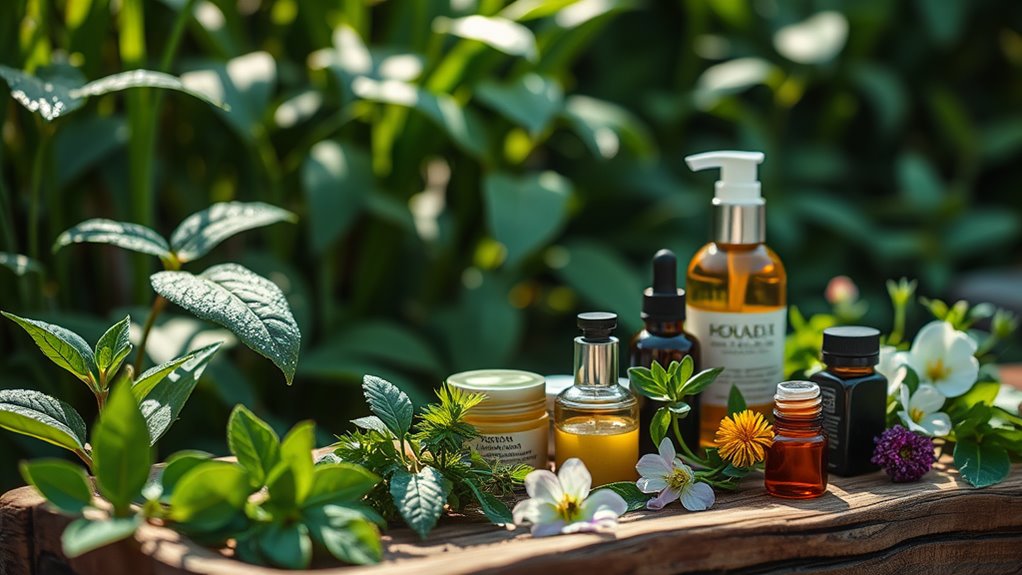Choosing organic skincare for sensitive skin is wise because it uses natural, plant-based ingredients that soothe rather than irritate. Ingredients like aloe vera and chamomile offer anti-inflammatory benefits, reducing redness and calming irritation. Organic products avoid harsh chemicals like parabens and sulfates, which can trigger sensitivity, ensuring your skin stays balanced and healthy. With USDA Organic or COSMOS certifications, you know you're getting high-quality ingredients free from synthetic additives. Additionally, organic skincare supports environmental sustainability, which means you're caring for your skin and the planet. Exploring these aspects helps elevate your skincare routine to a new level of conscientious care.
Understanding Sensitive Skin
Sensitive skin can be a bit of a mystery, but it's essential to understand its nuances if you're experiencing it. You might notice that certain products or environmental factors trigger redness, itching, or dryness. Understanding these reactions is the first step in managing your sensitive skin effectively. It's not just about what you put on your skin but also how your skin responds to various stimuli.
You need to pay attention to how your skin feels after cleansing or using specific products. Sometimes, even factors like climate changes or stress can exacerbate sensitivity. It's important to identify patterns in your skin's behavior. Are there certain times of the year or specific activities that make your skin act up? Keeping a journal can help you track these triggers.
Also, consider your skin's barrier function. With sensitive skin, the barrier that typically protects against irritants might be compromised. This means you should look for gentle, hydrating products that support barrier restoration. Avoid harsh exfoliants or overly-fragranced items that can strip your skin's natural oils. By recognizing your skin's unique needs and patterns, you'll be better equipped to choose products that nurture rather than irritate.
Benefits of Organic Ingredients
When it comes to skincare, choosing organic ingredients can be a game-changer for those with sensitive skin. Organic skincare products often contain natural, plant-based components that are gentle and less likely to irritate. You'll find that these ingredients are rich in nutrients, providing your skin with essential vitamins and antioxidants that help nourish and protect.
One major benefit of organic ingredients is their ability to soothe and calm your skin. Natural extracts like aloe vera, chamomile, and calendula have anti-inflammatory properties that can reduce redness and irritation. They help create a barrier that locks in moisture, keeping your skin hydrated and healthy.
Moreover, organic ingredients tend to be more environmentally friendly. By choosing products that are sustainably sourced and free from synthetic fertilizers or pesticides, you're not only caring for your skin but also supporting a cleaner planet.
Another advantage is the higher concentration of active ingredients found in organic products. This means you're likely to see more effective results without exposing your skin to unnecessary fillers. By opting for organic skincare, you're making a conscious decision to prioritize your skin's health and overall well-being.
Avoiding Harsh Chemicals

Maneuvering through the world of skincare, it is crucial to steer clear of harsh chemicals, especially if you have sensitive skin. These chemicals, often found in conventional skincare products, can irritate and exacerbate skin issues. Ingredients like parabens, sulfates, and synthetic fragrances are common culprits. They might promise quick results, but they can strip your skin's natural oils, leading to dryness or breakouts. For someone with sensitive skin, this can result in redness, itching, or even allergic reactions.
When you choose organic skincare, you greatly reduce the risk of encountering such harsh chemicals. Organic products focus on using naturally derived ingredients that are gentle on your skin. This means they're less likely to cause irritation, providing a safer alternative for your skincare routine. By avoiding these harsh substances, you help maintain your skin's natural balance and promote a healthier complexion.
Additionally, steering clear of these chemicals can benefit not just your skin, but also the environment. Many synthetic ingredients can harm ecosystems when washed away. By choosing organic options, you're making a choice that supports both your skin's health and the planet's well-being.
Natural Soothing Properties
Some people find that the natural soothing properties of organic skincare products make a significant difference for sensitive skin. When you choose organic, you're embracing ingredients like aloe vera, chamomile, and calendula, which are renowned for their calming effects. These gentle components work to reduce redness and irritation, leaving your skin feeling more balanced and comfortable.
Organic skincare leverages the power of nature to provide relief without the harshness of synthetic additives. You'll notice that these products often include essential oils and botanical extracts that help soothe inflamed skin. Lavender, for example, is not only calming to the senses but also helps alleviate discomfort. By incorporating these natural elements, organic skincare can create a more harmonious relationship with your skin's unique needs.
Moreover, these products tend to maintain the integrity of their ingredients. Since organic farming avoids chemical fertilizers and pesticides, the active elements in the products remain potent and effective. As you explore organic options, you'll find that they deliver a gentle touch, helping your sensitive skin feel nurtured. Embracing these natural soothing properties can be a game-changer for your skincare routine, offering comfort and peace of mind.
Reducing Allergic Reactions

In addition to their soothing properties, organic skincare products often excel at reducing allergic reactions, making them a wise choice for sensitive skin. When you choose organic options, you're less likely to encounter harsh chemicals, synthetic fragrances, and artificial preservatives that can irritate your skin. These elements are common culprits behind allergic reactions. Organic skincare products typically rely on natural ingredients like aloe vera, chamomile, and calendula, known for their gentle and calming effects.
By eliminating unnecessary additives, organic products reduce your skin's exposure to potential allergens. This means you can enjoy nourishing your skin without the worry of unexpected breakouts or irritation. You might find that your skin feels more balanced and comfortable, as organic ingredients often work harmoniously with your skin's natural barrier.
When shopping for skincare, always check labels for certifications like USDA Organic or Ecocert, as these can guarantee you of the product's authenticity. Remember, everyone's skin is unique, so it's important to patch-test new products, even organic ones, to verify compatibility. By prioritizing organic skincare, you're making a thoughtful choice that can lead to healthier, happier skin with fewer allergic reactions.
Environmental Impact
Choosing organic skincare products not only benefits your skin but also frequently contributes to a healthier planet. When you opt for organic skincare, you're supporting farming practices that avoid harmful pesticides and chemicals. These eco-friendly methods help reduce pollution and conserve water, ensuring that our planet remains vibrant and healthy for future generations.
Consider these key environmental advantages of choosing organic skincare:
- Reduced Chemical Runoff: Organic farming minimizes the release of synthetic fertilizers and pesticides into our water systems. This helps protect aquatic life and maintains cleaner water sources for everyone.
- Biodiversity Preservation: Organic farms rely on natural pest control and crop rotation, promoting a balanced ecosystem. This encourages the growth of diverse plant and animal species, supporting a healthier environment.
- Sustainable Soil Health: Organic practices enhance soil fertility through composting and natural amendments, which in turn supports long-term agricultural productivity. Healthy soil acts as a carbon sink, reducing the impact of climate change.
Choosing the Right Products

To confidently navigate the world of organic skincare, you should first understand what makes a product truly organic. Look for certifications from reputable organizations, such as USDA Organic or COSMOS. These certifications guarantee that products meet strict standards regarding ingredient sourcing and processing. Organic products should contain natural ingredients grown without synthetic fertilizers, pesticides, or genetically modified organisms.
When choosing the right products for your sensitive skin, read the ingredient list carefully. Prioritize items with recognizable, plant-based components. Avoid products with synthetic fragrances, parabens, and sulfates, as they can irritate sensitive skin. Instead, opt for gentle, nourishing ingredients like aloe vera, chamomile, and calendula. These natural elements can soothe and hydrate your skin without causing irritation.
Test products on a small patch of your skin before applying them to your whole face. This step helps you identify potential allergies or reactions. Additionally, consider the product's packaging. Eco-friendly packaging aligns with the sustainable principles of organic skincare and reduces environmental impact.
Finally, consult with a dermatologist if you're unsure about a product's suitability for your skin type. They can provide personalized recommendations, guaranteeing you choose the best organic skincare products for your sensitive skin.
Tips for Effective Skincare
Achieving radiant skin requires a thoughtful skincare routine tailored to your unique needs. When dealing with sensitive skin, it's important to choose products that nourish without irritation. Here's how you can craft an effective skincare regimen:
- Gentle Cleansing: Start with a gentle, organic cleanser that respects your skin's natural barrier. Avoid harsh ingredients like sulfates and opt for calming alternatives such as aloe vera or chamomile. This guarantees your skin is clean without stripping away essential oils.
- Hydration is Key: Sensitive skin often craves hydration. Use an organic moisturizer that contains soothing ingredients like shea butter or jojoba oil. These ingredients provide deep nourishment and help lock in moisture, maintaining your skin's softness and elasticity.
- Sun Protection: Never skip sunscreen, even on cloudy days. Choose a mineral-based sunscreen with zinc oxide or titanium dioxide to protect against harmful UV rays without causing irritation. This step is essential in preventing premature aging and maintaining an even skin tone.
Frequently Asked Questions
How Can I Transition From Conventional to Organic Skincare Products?
Start by researching organic products that suit your needs. Gradually replace one product at a time to allow your skin to adjust. Pay attention to ingredient labels, and patch test before fully incorporating any new item into your routine.
Are Organic Skincare Products Cruelty-Free?
Imagine a gentle touch on a petal. Organic skincare products often embody this kindness, ensuring they're cruelty-free. You'll find many brands committed to animal welfare, but always check certifications like Leaping Bunny or PETA to confirm.
What Certifications Should I Look for in Organic Skincare?
When you're choosing organic skincare, look for certifications like USDA Organic, COSMOS, or Ecocert. These guarantee the products meet strict organic standards. Don't overlook cruelty-free certifications like Leaping Bunny to guarantee ethical practices.
Can Organic Skincare Help With Acne-Prone Sensitive Skin?
You've got acne-prone, sensitive skin, and organic skincare might help. These products often contain fewer irritants and more natural ingredients, soothing your skin while targeting breakouts. Always patch-test and choose products with anti-inflammatory properties.
How Do I Store Organic Skincare Products to Maintain Their Efficacy?
Think of organic skincare as a delicate flower. You've got to store it in a cool, dark place, away from sunlight and heat, to preserve its beauty and potency. Keep it sealed, and it'll thrive.
At a Glance
In the quest for radiant and healthy skin, think of organic skincare as your Excalibur—powerful and pure. By choosing products without harsh chemicals, you're protecting your sensitive skin like a knight shielding a kingdom. Organic ingredients soothe naturally, reducing allergic reactions and leaving your skin calm and glowing. Plus, you're championing the Earth, making eco-friendly choices. Embrace this path, and your skin will thank you with every gentle, beautiful glow.






